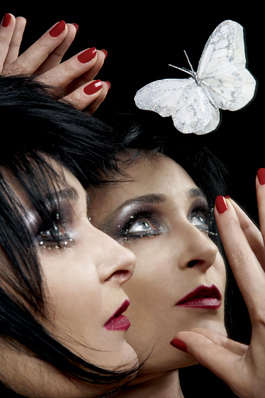home | metro silicon valley index | music & nightlife | band review

DOUBLE TROUBLE: Siouxsie helped the Banshees turn angst into record sales in the '80s.
Doom and Gloom
Bay Area tribute bands keep foreboding sound of '80s goth rock alive
By Garrett Wheeler
IN 1979, the English rock band Bauhaus recorded a nine-minute song that captured a distinctly gloomy mood augmented by jagged guitar lines and dark, foreboding keyboards. As a minimalist, free-form composition, "Bela Lugosi's Dead" represented a new aesthetic in rock music, one that contrasted deeply with the fluorescent glow emitted by the popular music of the coming decade.
Although Bauhaus would never outgrow its original cult status, a slew of like-minded groups emerged from the English punk scene to form the newly coined gothic-rock genre.
For thousands of teenagers across America, the bleak atmosphere created by this new artistic movement became a refuge from the inherently superficial whirlwind of pop icons like Madonna, Prince and Michael Jackson. Goth rock was here to stay, and although the popularity of '90s grunge would ultimately sweep the genre out of the mainstream, its presence lives on.
Outside of the major-media spotlight cast on Marilyn Manson, nowhere is the manifestation of goth rock more visible than in the almighty tribute band. And the Bay Area is home to at least three of them.
Although they only existed for three years, England's Joy Division was arguably the most influential of the proto-goth-rock groups, ushering in a new sound that combined the raw emotion of punk with a softer, more subdued style. Lead vocalist Ian Curtis embodied Joy Division's haunting restraint with his tortured lyrics and manic stage behavior.
In a fitting ode to Curtis, San Francisco's Dead Souls work tirelessly to replicate Joy Division's melancholic songs, with singer Dave Tibbs in charge of bringing Curtis' melodrama to life. Some of Joy Division's best-known tracks are seamlessly re-created by the Dead Souls, such as the brooding "Love Will Tear Us Apart." Musically, the Dead Souls bring audiences as close to Joy Division as they'll ever get (Curtis committed suicide in 1980), with Tibbs marvelously imitating Curtis' vocal complexities while guitarist Orlando Cerecedes, bassist Paul Skibitzke and drummer Sonya Empty provide an immaculate backdrop.
Unlike Joy Division, fellow London gloom-rock trio Siouxsie and the Banshees enjoyed a career marked by longevity and even some commercial success. Led by the overtly sexual and vampirelike Siouxsie Sioux, the group became one of the most influential goth-rock bands of the era.
It's not surprising that several Siouxsie tribute groups have sprung up over the years, but none with more character than the Bay Area's Spellbound. Kilby Black assumes the role of Siouxsie, donning the black-leather getup of her forbearer with natural ease. Black's vocal capabilities certainly do justice to Siouxsie's legacy, and her makeup lacks nothing from the original. Guitarist Cerecedes once again finds his way into the mix, providing the sophisticated havoc that characterized the Banshees' sound.
Lesser known than Joy Division and Siouxsie and the Banshees but of no less importance to the goth-rock arcadia are the Sisters of Mercy. Their slow, ominous fusion of metal and psychedelic pop stands as one of the more unique products of the genre, and often combined dark, menacing rock melodies with synthesized dance beats created on a drum machine dubbed Doktor Avalanche.
Strange and sinister almost to a point of ironic exaggeration, the Sisters of Mercy have been resurrected by some Bay Area musicians who perform under the name the Reptile House. As if in acknowledgment of the Sisters' eccentricity, the Reptile House's mission statement is simply "in case you didn't get it the first time around." Indeed, paying tribute to a band that was less than accessible even in its prime may seem daunting, but to the Reptile House, it is, above all, the "wit, wisdom, and wattage" of the Sisters of Mercy that must be preserved.
Although the original goth-rock scene was centered in London, it quickly permeated countercultures across Europe and America, eventually finding its way to the Bay Area. If anything can be learned from the pioneers of the genre, it is that factions of the public audience will inevitably gravitate toward cultural styles that stray from the mainstream. In the case of the goth era, that divergence from the plastic pop of the '80s could be found in a pair of black leather pants, dark eyeliner and the wavering sound of a minor chord played through a synthesizer.
THE DEAD SOULS, SPELLBOUND and THE REPTILE HOUSE play Friday (April 24) at 9pm at the VooDoo Lounge, 14 S. Second St., San Jose. Tickets are $10. (408.286.8636)
Send a letter to the editor about this story.
|
|
|
|
|
|